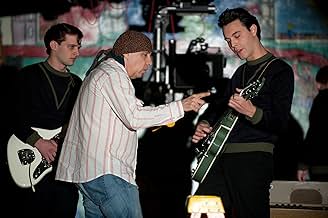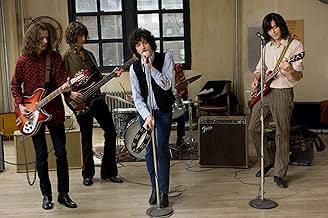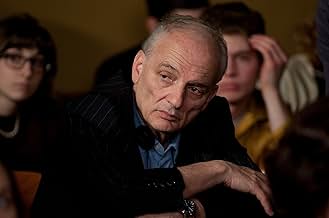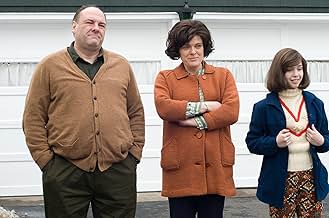IMDb-BEWERTUNG
6,0/10
5056
IHRE BEWERTUNG
Rock 'n' Roll Coming-of-Age-Story über eine Gruppe von Vorstadt-Teens in einer 60er-Jahre Rockband.Rock 'n' Roll Coming-of-Age-Story über eine Gruppe von Vorstadt-Teens in einer 60er-Jahre Rockband.Rock 'n' Roll Coming-of-Age-Story über eine Gruppe von Vorstadt-Teens in einer 60er-Jahre Rockband.
- Auszeichnungen
- 3 Gewinne & 3 Nominierungen insgesamt
Christopher Bannow
- Dave Smith
- (as Chris Bannow)
Empfohlene Bewertungen
David Chase's anticipated Not Fade Away not only jumbles itself into an indulgent story, constantly keeping the audience at an arm's length but it's overly stretched and uneven not utilizing the strong talents in the film like James Gandolfini, Jack Huston, and John Magaro. A natural comparison to Almost Famous (2000), the film doesn't hold a candle to Cameron Crowe's homage to music. Showcasing outstanding music of the 1960′s and 1970′s, Chase manages to capture moments of the young adolescent mind longing to be more. Lead Magaro delivers a character transformation of mind and body, a turn that elevates the film considerably. The great Jack Huston, an actor that will likely be one of the biggest things in Hollywood any minute now, delivers an aggressive supporting turn reminiscent of Channing Tatum's work in A Guide to Recognizing Your Saints (2006). Bella Heathcote shows tenderness and promise but undervalued and virtually unused. James Gandolfini, stands out with charisma and garners much of the big laughs. A great character actor like Gandolfini should be given room to move. The film ultimately fails because it never feels like Chase knows his film or where he wants it to go. The last twenty minutes feel unneeded, unearned, and thrown together for an "artistic" catalyst with no emotional or technical effect whatsoever. A large disappointment.
David Chase's Not Fade Away is an exercise in nostalgia in a competent order, meaning that those who enjoy or, above all, relate to the events in the film will appreciate it the most. I'm stuck in the position where I often find my self; on the corner of admiration and disappointment.
Stylistically, David Chase (TV's The Soprano's) and cinematographer Eigil Bryld (Netflix's own TV series House of Cards) couldn't have made a more bleeding-gums representation of the 1960's if they tried. It looks marvelous in all its polished, minimalist glory. Thematically and applicably, there should've been so much more of a story to tell about a garage band that never made it despite determination to "not fade away." For this reason, the film can be viewed as one where talents embrace culture, chew scenery, and nothing more.
The story concerns Douglas (John Magaro), a young man in the 1960's during a time of The Vietnam War and inevitable social change. Family values and daintiness are becoming more lenient, and views on the war divide parents, who sat back and formed opinions on it, and teenagers who had to fight it. Douglas decides to round up a few pals and start a garage band with intent to "make it big" like the iconic Beatles and Rolling Stones. Faced with loud opposition from his demanding bigot of a father (James Gandolfini) and attachment to his girlfriend (Meg Guzulescu), Douglas must now keep a band together without alienating those close to him.
This is a story that through heatbreak, aspirations, and prolific failures could've made a gripping film and possibly an emotional one. The downside is through Chase's direction does the film feel sterile and ill-equipped. He doesn't seem to possess any form of relation or personal resonance with his characters, and this awkward coldness halts the film's ability to allow its audience to admire if even differentiate the teenagers the sixties was known to birth.
What we are left with, predominately, is an egg with a firm, ambitious, beautifully crisp shell, but sub-par, underwhelming contents. "Style over substance" would seem to be an appropriate term, but I hesitate to even call it that seeing as social order, parental discrepancies, and culture shock - all easy items to exclude or nudge out of bounds - are touched on and explored considerably. One of the tensest scenes, and arguably the best, is when Douglas is at dinner with many of his relatives, remaining silent while they discuss emerging culture and minorities in a wonderfully ethnocentric way. Douglas is ostracized and belittled for his optimism on his garage band project and his long, "hippie" hair before telling off his father and exiting the room.
Chase definitely understands complex changes of norms and societal disconnect between parents and youths. However, his apparent lack of interest in his characters, giving them a shocking lack of depth and personality, undermines the power Not Fade Away could've head if it resonated with its target audience (those now in their forties or fifties). Yet, its characters are as vacant as clip-art pictures of teenagers from the time period. There's a powerful, life-affirming, deeply involving story in the material Not Fade Away provides and I anxiously await its telling by a director with more of an attitude and opinion on the subject.
Starring: John Magaro, Meg Guzulescu, and James Gandolfini. Directed by: David Chase.
Stylistically, David Chase (TV's The Soprano's) and cinematographer Eigil Bryld (Netflix's own TV series House of Cards) couldn't have made a more bleeding-gums representation of the 1960's if they tried. It looks marvelous in all its polished, minimalist glory. Thematically and applicably, there should've been so much more of a story to tell about a garage band that never made it despite determination to "not fade away." For this reason, the film can be viewed as one where talents embrace culture, chew scenery, and nothing more.
The story concerns Douglas (John Magaro), a young man in the 1960's during a time of The Vietnam War and inevitable social change. Family values and daintiness are becoming more lenient, and views on the war divide parents, who sat back and formed opinions on it, and teenagers who had to fight it. Douglas decides to round up a few pals and start a garage band with intent to "make it big" like the iconic Beatles and Rolling Stones. Faced with loud opposition from his demanding bigot of a father (James Gandolfini) and attachment to his girlfriend (Meg Guzulescu), Douglas must now keep a band together without alienating those close to him.
This is a story that through heatbreak, aspirations, and prolific failures could've made a gripping film and possibly an emotional one. The downside is through Chase's direction does the film feel sterile and ill-equipped. He doesn't seem to possess any form of relation or personal resonance with his characters, and this awkward coldness halts the film's ability to allow its audience to admire if even differentiate the teenagers the sixties was known to birth.
What we are left with, predominately, is an egg with a firm, ambitious, beautifully crisp shell, but sub-par, underwhelming contents. "Style over substance" would seem to be an appropriate term, but I hesitate to even call it that seeing as social order, parental discrepancies, and culture shock - all easy items to exclude or nudge out of bounds - are touched on and explored considerably. One of the tensest scenes, and arguably the best, is when Douglas is at dinner with many of his relatives, remaining silent while they discuss emerging culture and minorities in a wonderfully ethnocentric way. Douglas is ostracized and belittled for his optimism on his garage band project and his long, "hippie" hair before telling off his father and exiting the room.
Chase definitely understands complex changes of norms and societal disconnect between parents and youths. However, his apparent lack of interest in his characters, giving them a shocking lack of depth and personality, undermines the power Not Fade Away could've head if it resonated with its target audience (those now in their forties or fifties). Yet, its characters are as vacant as clip-art pictures of teenagers from the time period. There's a powerful, life-affirming, deeply involving story in the material Not Fade Away provides and I anxiously await its telling by a director with more of an attitude and opinion on the subject.
Starring: John Magaro, Meg Guzulescu, and James Gandolfini. Directed by: David Chase.
David Chase's "Not Fade Away" looks at what it was like to come of age in the '60s. The main focus is a New Jersey teenager who decides to join a band, but there are clear signs of everything that was going on: the Vietnam War, the generation gap, racial tensions, and Dean Martin's mean-spirited comment about the Beatles. Contrary to the previous reviewer, I would say that this movie is better than "Almost Famous". The latter was too fluffy and came across as a sanitized look at its era. This one is very upfront about what sorts of things happened (including some very tense scenes). And the final line poses a good question about how we as Americans want to be known to the world. Can we eventually look to our best qualities to do what's right?
Anyway, this is a good movie. It's got great music and brings up some important points. I recommend it.
Anyway, this is a good movie. It's got great music and brings up some important points. I recommend it.
Reading some of the other reviews I can somewhat see positive interpretations of this movie: life as a young person in the 60s was not cohesive or predictable thus it is fitting for this film to be "confused". The problem is that the more or less random snapshots of the particular life we are witnessing illustrate the decade in ways we already understand: I like the Beatles, I am sad and mad when MLK is shot, I don't want to go to 'Nam.
Without the support of a plot or structured character development, one can anticipate the emptiness of it all. Too many threads are planted at once and they all die in strangled, choppy mess. Finally, individual scenes are executed in a way that is flowery, verbose, and predictable, which leaves each self-indulgent attempt at emotion-evoking very obvious.
Nostalgia is strong, and a few shivers-down-the-spine moments will no doubt come, which makes it easy to overrate this film. However those moments happen *despite* the film: cool history and good music are powerful things.
Without the support of a plot or structured character development, one can anticipate the emptiness of it all. Too many threads are planted at once and they all die in strangled, choppy mess. Finally, individual scenes are executed in a way that is flowery, verbose, and predictable, which leaves each self-indulgent attempt at emotion-evoking very obvious.
Nostalgia is strong, and a few shivers-down-the-spine moments will no doubt come, which makes it easy to overrate this film. However those moments happen *despite* the film: cool history and good music are powerful things.
Not Fade Away takes me back to the Sixties when I would have been of the age that the young people of the film are in. Certainly the music was nostalgic enough and that will satisfy any number of fans.
James Gandolfini who starred as that other New Jersey legend of more recent vintage, Tony Soprano stars here as the father of aspiring musician John Magaro who wants more than anything else to succeed in Rock and Roll as those new groups from Great Britain are doing, The Beatles and The Rolling Stones. He and friends from his suburban New Jersey want to become rock stars only there's a lot more work involved than originally thought.
As for dad, Gandolfini doesn't like the kid's views or the new mod style of dress that his son is now taking up. He's a typical blue collar guy who has some real concerns about the family business and some even bigger concerns for his health. The two clash and their clash is what drives Not Fade Away.
I remember some kids on my block who were growing up including my next door neighbor in Brooklyn were doing exactly what Magaro and his friends were doing. None of them as I know stuck with music, but all apparently led successful lives, at least I've heard nothing different.
The music is wonderful if Sixties rock is your taste this is your film. The plot however is nothing that we haven't seen before. And Not Fade Away is hampered by a lack of character development other than Gandolfini and Magaro. But these two may be worth a look and a listen.
James Gandolfini who starred as that other New Jersey legend of more recent vintage, Tony Soprano stars here as the father of aspiring musician John Magaro who wants more than anything else to succeed in Rock and Roll as those new groups from Great Britain are doing, The Beatles and The Rolling Stones. He and friends from his suburban New Jersey want to become rock stars only there's a lot more work involved than originally thought.
As for dad, Gandolfini doesn't like the kid's views or the new mod style of dress that his son is now taking up. He's a typical blue collar guy who has some real concerns about the family business and some even bigger concerns for his health. The two clash and their clash is what drives Not Fade Away.
I remember some kids on my block who were growing up including my next door neighbor in Brooklyn were doing exactly what Magaro and his friends were doing. None of them as I know stuck with music, but all apparently led successful lives, at least I've heard nothing different.
The music is wonderful if Sixties rock is your taste this is your film. The plot however is nothing that we haven't seen before. And Not Fade Away is hampered by a lack of character development other than Gandolfini and Magaro. But these two may be worth a look and a listen.
Wusstest du schon
- WissenswertesMost feature films slot 1-2 percent of production costs for the music budget, but in "Fade', music supervisor Steven Van Zandt, had about 10% of the $20-million-plus budget or at least $2 million.
- PatzerNobody said "elementary school" in North Jersey, at least not those days. Grades 1-6 (or 1-8 if you went to Catholic school) was called "grammar school."
- VerbindungenFeatures Süd Pazifik (1958)
- SoundtracksPeppermint Twist
Written by Joey Dee (as Joseph Di Nicola) and Henry Glover
Performed by Joey Dee and The Starliters
Courtesy of Rhino Entertainment Company
By arrangement with Warner Music Group Film & TV Licensing
Top-Auswahl
Melde dich zum Bewerten an und greife auf die Watchlist für personalisierte Empfehlungen zu.
- How long is Not Fade Away?Powered by Alexa
Details
Box Office
- Budget
- 20.000.000 $ (geschätzt)
- Bruttoertrag in den USA und Kanada
- 610.792 $
- Eröffnungswochenende in den USA und in Kanada
- 19.182 $
- 23. Dez. 2012
- Weltweiter Bruttoertrag
- 636.399 $
- Laufzeit1 Stunde 57 Minuten
- Farbe
- Sound-Mix
- Seitenverhältnis
- 1.85 : 1
Zu dieser Seite beitragen
Bearbeitung vorschlagen oder fehlenden Inhalt hinzufügen





































